-
 Bitcoin
Bitcoin $85,697.3844
1.57% -
 Ethereum
Ethereum $1,638.9615
0.39% -
 Tether USDt
Tether USDt $0.9999
0.00% -
 XRP
XRP $2.1668
2.02% -
 BNB
BNB $589.6303
0.00% -
 Solana
Solana $132.3928
-0.10% -
 USDC
USDC $1.0000
-0.01% -
 TRON
TRON $0.2521
-1.70% -
 Dogecoin
Dogecoin $0.1597
-2.28% -
 Cardano
Cardano $0.6439
0.85% -
 UNUS SED LEO
UNUS SED LEO $9.4287
0.41% -
 Chainlink
Chainlink $12.6833
-0.80% -
 Avalanche
Avalanche $20.0262
0.05% -
 Stellar
Stellar $0.2425
-0.03% -
 Toncoin
Toncoin $2.9684
4.14% -
 Sui
Sui $2.2145
-3.52% -
 Hedera
Hedera $0.1672
0.05% -
 Shiba Inu
Shiba Inu $0.0...01194
-1.99% -
 Bitcoin Cash
Bitcoin Cash $333.3345
-1.23% -
 Litecoin
Litecoin $77.8594
0.59% -
 Polkadot
Polkadot $3.7096
1.64% -
 Hyperliquid
Hyperliquid $16.3941
4.91% -
 Dai
Dai $1.0000
0.01% -
 Bitget Token
Bitget Token $4.3126
1.07% -
 Pi
Pi $0.7411
-1.42% -
 Ethena USDe
Ethena USDe $0.9991
0.02% -
 Monero
Monero $213.9141
2.70% -
 Uniswap
Uniswap $5.4003
-0.80% -
 OKB
OKB $52.2630
-1.39% -
 Pepe
Pepe $0.0...07415
0.89%
Does the Exodus wallet support token standards other than ERC-20?
Exodus wallet supports a wide range of token standards beyond ERC-20, including BEP-20, TRC-20, BEP-2, SPL, Omni, and QRC-20, enhancing portfolio management.
Apr 08, 2025 at 05:29 am
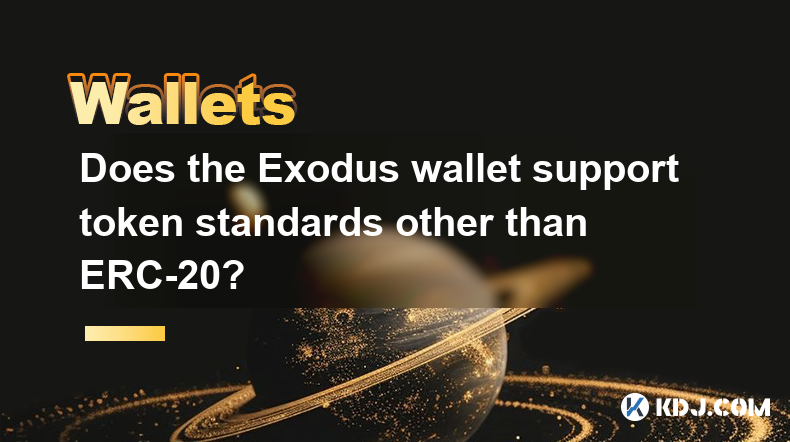
The Exodus wallet is a popular choice among cryptocurrency enthusiasts for its user-friendly interface and robust security features. While many users are familiar with its support for ERC-20 tokens, a common question arises: does the Exodus wallet support token standards other than ERC-20? In this article, we will explore the various token standards supported by Exodus, providing a comprehensive overview of its capabilities beyond ERC-20.
Exodus wallet is known for its wide range of supported cryptocurrencies and token standards. While ERC-20 tokens are widely supported, Exodus goes beyond this standard to accommodate a variety of other token standards. This allows users to manage a diverse portfolio within a single wallet, enhancing the flexibility and convenience of their cryptocurrency management.
Support for BEP-20 Tokens
One of the token standards supported by Exodus is BEP-20, which is native to the Binance Smart Chain. BEP-20 tokens have gained popularity due to their low transaction fees and fast transaction times. Exodus users can easily manage their BEP-20 tokens alongside their other assets, making it a convenient option for those involved in the Binance ecosystem.
To manage BEP-20 tokens in Exodus, users need to:
- Ensure their wallet is updated to the latest version.
- Add the BNB Smart Chain network to their wallet settings.
- Import or receive BEP-20 tokens into their wallet.
Support for TRC-20 Tokens
Exodus also supports TRC-20 tokens, which are based on the TRON blockchain. TRC-20 tokens are known for their high throughput and low transaction costs, making them an attractive option for developers and users alike. With Exodus, users can seamlessly integrate TRC-20 tokens into their portfolio, benefiting from the efficiency of the TRON network.
To manage TRC-20 tokens in Exodus, users should:
- Update their wallet to the latest version.
- Add the TRON network to their wallet settings.
- Import or receive TRC-20 tokens into their wallet.
Support for BEP-2 Tokens
In addition to BEP-20, Exodus supports BEP-2 tokens, which are native to the Binance Chain. BEP-2 tokens are primarily used for trading on the Binance DEX, and Exodus users can manage these tokens directly within their wallet. This feature is particularly useful for those who actively trade on the Binance DEX and want to keep their assets organized in one place.
To manage BEP-2 tokens in Exodus, users need to:
- Ensure their wallet is updated to the latest version.
- Add the Binance Chain network to their wallet settings.
- Import or receive BEP-2 tokens into their wallet.
Support for SPL Tokens
Exodus also supports SPL (Solana Program Library) tokens, which are native to the Solana blockchain. SPL tokens are known for their high performance and scalability, making them a popular choice for decentralized applications. With Exodus, users can manage their SPL tokens alongside other assets, taking advantage of the Solana network's capabilities.
To manage SPL tokens in Exodus, users should:
- Update their wallet to the latest version.
- Add the Solana network to their wallet settings.
- Import or receive SPL tokens into their wallet.
Support for Omni Tokens
Another token standard supported by Exodus is Omni, which is built on the Bitcoin blockchain. Omni tokens are used for various applications, including asset issuance and decentralized trading. Exodus users can manage their Omni tokens within the wallet, benefiting from the security and stability of the Bitcoin network.
To manage Omni tokens in Exodus, users need to:
- Ensure their wallet is updated to the latest version.
- Add the Bitcoin network to their wallet settings.
- Import or receive Omni tokens into their wallet.
Support for QRC-20 Tokens
Exodus also supports QRC-20 tokens, which are based on the Qtum blockchain. QRC-20 tokens are designed to be compatible with Ethereum's ERC-20 standard, making it easier for developers to port their projects to the Qtum network. With Exodus, users can manage their QRC-20 tokens alongside other assets, enhancing their portfolio's diversity.
To manage QRC-20 tokens in Exodus, users should:
- Update their wallet to the latest version.
- Add the Qtum network to their wallet settings.
- Import or receive QRC-20 tokens into their wallet.
Support for Other Token Standards
In addition to the aforementioned token standards, Exodus may support other token standards as well. The wallet's developers are continually working to expand its capabilities, ensuring that users have access to a wide range of cryptocurrencies and tokens. Users can check the official Exodus website or the wallet's settings to see the full list of supported token standards and networks.
To explore other token standards in Exodus, users can:
- Visit the official Exodus website for the latest information.
- Check the wallet's settings for a list of supported networks and tokens.
- Contact Exodus support for specific inquiries about token standard support.
Benefits of Using Exodus for Multiple Token Standards
Using Exodus to manage multiple token standards offers several benefits to users. Firstly, it provides a centralized platform for managing a diverse portfolio, reducing the need for multiple wallets. This enhances security and convenience, as users can access all their assets in one place. Additionally, Exodus's user-friendly interface makes it easy for users to navigate and manage different token standards, even if they are new to the cryptocurrency space.
Some key benefits of using Exodus for multiple token standards include:
- Centralized management of a diverse portfolio.
- Enhanced security by reducing the need for multiple wallets.
- User-friendly interface for easy navigation and management.
- Regular updates to support new token standards and networks.
Limitations and Considerations
While Exodus supports a wide range of token standards, there are some limitations and considerations that users should be aware of. Not all token standards may be supported at the time of writing, and the wallet's developers may prioritize certain standards over others. Additionally, users should ensure that they are using the latest version of the wallet to access the most up-to-date features and support for various token standards.
Some important considerations when using Exodus for multiple token standards include:
- Not all token standards may be supported at any given time.
- Regular updates are necessary to access the latest features and support.
- Prioritization of certain token standards by the developers.
- User responsibility to stay informed about supported standards and networks.
Conclusion
In conclusion, the Exodus wallet supports a variety of token standards beyond ERC-20, including BEP-20, TRC-20, BEP-2, SPL, Omni, and QRC-20. This wide range of support allows users to manage a diverse portfolio within a single, user-friendly platform. While there are some limitations and considerations to keep in mind, Exodus remains a popular choice for those looking to manage multiple token standards efficiently and securely.
Common Questions and Answers:
Q: Does Exodus support BEP-20 tokens?
A: Yes, Exodus supports BEP-20 tokens, which are native to the Binance Smart Chain. Users can manage these tokens within the wallet by adding the BNB Smart Chain network to their settings.
Q: Can I manage TRC-20 tokens in Exodus?
A: Yes, Exodus supports TRC-20 tokens, which are based on the TRON blockchain. Users can add the TRON network to their wallet settings and manage their TRC-20 tokens alongside other assets.
Q: Is it possible to use Exodus for BEP-2 tokens?
A: Yes, Exodus supports BEP-2 tokens, which are native to the Binance Chain. Users can add the Binance Chain network to their wallet settings and manage their BEP-2 tokens within the wallet.
Q: Does Exodus support SPL tokens?
A: Yes, Exodus supports SPL tokens, which are native to the Solana blockchain. Users can add the Solana network to their wallet settings and manage their SPL tokens alongside other assets.
Q: Can I manage Omni tokens in Exodus?
A: Yes, Exodus supports Omni tokens, which are built on the Bitcoin blockchain. Users can add the Bitcoin network to their wallet settings and manage their Omni tokens within the wallet.
Q: Does Exodus support QRC-20 tokens?
A: Yes, Exodus supports QRC-20 tokens, which are based on the Qtum blockchain. Users can add the Qtum network to their wallet settings and manage their QRC-20 tokens alongside other assets.
Q: How can I check if a specific token standard is supported by Exodus?
A: Users can check the official Exodus website for the latest information on supported token standards. Additionally, they can review the wallet's settings for a list of supported networks and tokens or contact Exodus support for specific inquiries.
Q: What are the benefits of using Exodus for multiple token standards?
A: Using Exodus for multiple token standards offers centralized management of a diverse portfolio, enhanced security by reducing the need for multiple wallets, a user-friendly interface for easy navigation, and regular updates to support new token standards and networks.
Q: Are there any limitations to using Exodus for multiple token standards?
A: Yes, some limitations include not all token standards being supported at any given time, the need for regular updates to access the latest features and support, prioritization of certain token standards by the developers, and the user's responsibility to stay informed about supported standards and networks.
Disclaimer:info@kdj.com
The information provided is not trading advice. kdj.com does not assume any responsibility for any investments made based on the information provided in this article. Cryptocurrencies are highly volatile and it is highly recommended that you invest with caution after thorough research!
If you believe that the content used on this website infringes your copyright, please contact us immediately (info@kdj.com) and we will delete it promptly.
- Ethereum (ETH) Price Prediction: ETH Up for Rally As Buying Signal Flashes
- 2025-04-15 18:00:12
- XRP Price Prediction: Technical Analysis and Market Momentum
- 2025-04-15 18:00:12
- Toncoin (TON) Is in the Spotlight as Several On-Chain and Technical Indicators Suggest a Possible Rally
- 2025-04-15 17:55:15
- MAGACOINFINANCE – Viral Momentum With Real ROI
- 2025-04-15 17:55:15
- When Peter Brandt speaks, the markets listen. This trading veteran, active since the 1970s, dropped a bombshell
- 2025-04-15 17:55:13
- KiloEx, a decentralized exchange (DEX) for trading perpetual futures, was hit by a sophisticated attack
- 2025-04-15 17:55:13
Related knowledge
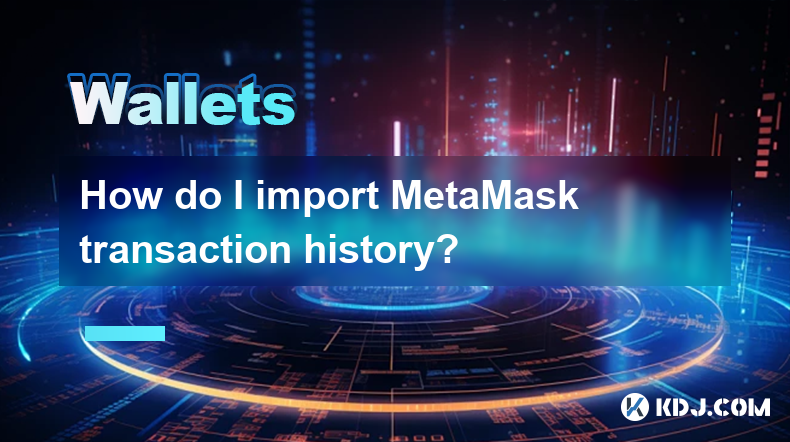
How do I import MetaMask transaction history?
Apr 12,2025 at 07:35pm
Importing your MetaMask transaction history can be an essential task for managing your cryptocurrency activities. Whether you're looking to keep a record of your transactions for tax purposes or simply want to track your investment performance, understanding how to import your transaction history is crucial. In this article, we'll explore the detailed s...
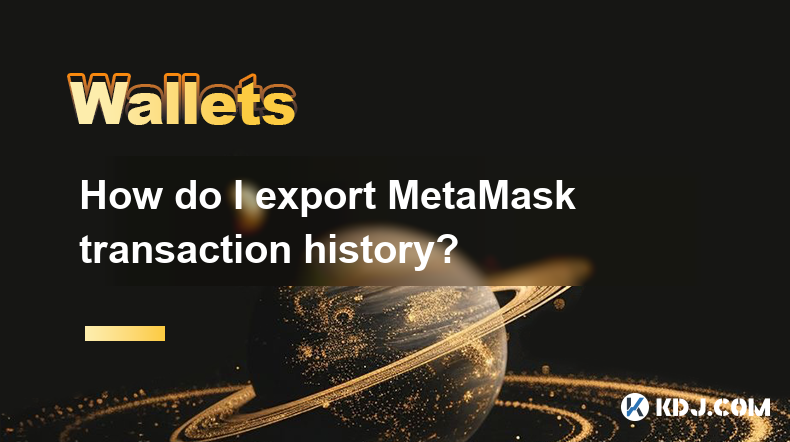
How do I export MetaMask transaction history?
Apr 14,2025 at 05:21am
Exporting your MetaMask transaction history can be a crucial task for keeping track of your cryptocurrency transactions, whether for personal records, tax purposes, or auditing. In this article, we will guide you through the process of exporting your MetaMask transaction history in a detailed, step-by-step manner. Understanding MetaMask Transaction Hist...
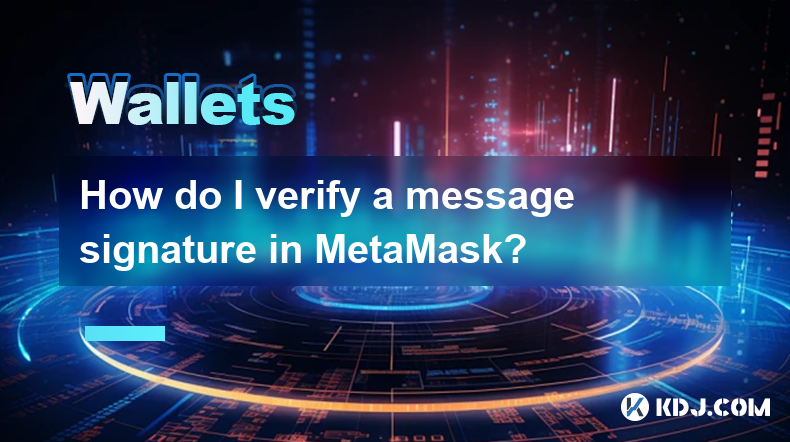
How do I verify a message signature in MetaMask?
Apr 14,2025 at 02:49am
Verifying a message signature in MetaMask is a crucial skill for anyone involved in the cryptocurrency space, especially when it comes to ensuring the authenticity and integrity of communications. This process allows you to confirm that a message was indeed signed by the owner of a specific Ethereum address. In this article, we will walk you through the...
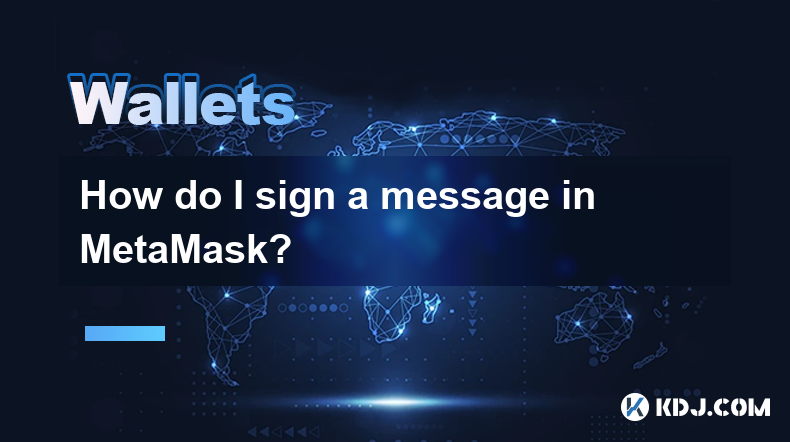
How do I sign a message in MetaMask?
Apr 12,2025 at 08:49pm
Introduction to Message Signing in MetaMaskMessage signing is a crucial feature in the world of cryptocurrencies, particularly when using wallets like MetaMask. It allows users to prove ownership of their wallet address without transferring any funds. This process involves generating a unique signature using your private key, which can then be verified ...
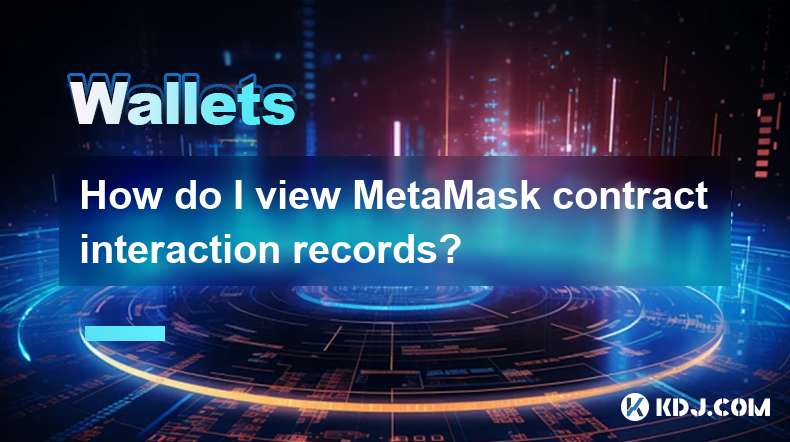
How do I view MetaMask contract interaction records?
Apr 13,2025 at 02:35am
Introduction to MetaMask and Contract InteractionsMetaMask is a popular cryptocurrency wallet that allows users to interact with the Ethereum blockchain and other compatible networks. One of the key features of MetaMask is the ability to interact with smart contracts, which are self-executing programs stored on the blockchain. These interactions can inc...
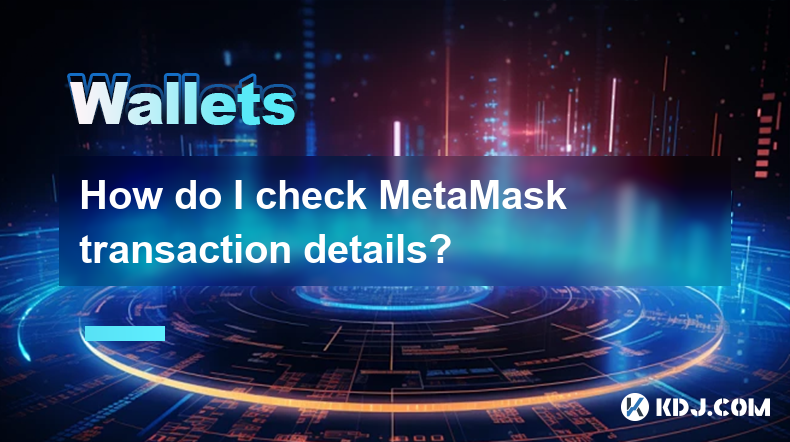
How do I check MetaMask transaction details?
Apr 15,2025 at 02:35pm
Checking MetaMask transaction details is an essential skill for anyone using this popular cryptocurrency wallet. Whether you're tracking a recent transaction, verifying its status, or troubleshooting issues, understanding how to access and interpret transaction details can help you manage your crypto assets effectively. In this article, we'll walk you t...

How do I import MetaMask transaction history?
Apr 12,2025 at 07:35pm
Importing your MetaMask transaction history can be an essential task for managing your cryptocurrency activities. Whether you're looking to keep a record of your transactions for tax purposes or simply want to track your investment performance, understanding how to import your transaction history is crucial. In this article, we'll explore the detailed s...

How do I export MetaMask transaction history?
Apr 14,2025 at 05:21am
Exporting your MetaMask transaction history can be a crucial task for keeping track of your cryptocurrency transactions, whether for personal records, tax purposes, or auditing. In this article, we will guide you through the process of exporting your MetaMask transaction history in a detailed, step-by-step manner. Understanding MetaMask Transaction Hist...

How do I verify a message signature in MetaMask?
Apr 14,2025 at 02:49am
Verifying a message signature in MetaMask is a crucial skill for anyone involved in the cryptocurrency space, especially when it comes to ensuring the authenticity and integrity of communications. This process allows you to confirm that a message was indeed signed by the owner of a specific Ethereum address. In this article, we will walk you through the...

How do I sign a message in MetaMask?
Apr 12,2025 at 08:49pm
Introduction to Message Signing in MetaMaskMessage signing is a crucial feature in the world of cryptocurrencies, particularly when using wallets like MetaMask. It allows users to prove ownership of their wallet address without transferring any funds. This process involves generating a unique signature using your private key, which can then be verified ...

How do I view MetaMask contract interaction records?
Apr 13,2025 at 02:35am
Introduction to MetaMask and Contract InteractionsMetaMask is a popular cryptocurrency wallet that allows users to interact with the Ethereum blockchain and other compatible networks. One of the key features of MetaMask is the ability to interact with smart contracts, which are self-executing programs stored on the blockchain. These interactions can inc...

How do I check MetaMask transaction details?
Apr 15,2025 at 02:35pm
Checking MetaMask transaction details is an essential skill for anyone using this popular cryptocurrency wallet. Whether you're tracking a recent transaction, verifying its status, or troubleshooting issues, understanding how to access and interpret transaction details can help you manage your crypto assets effectively. In this article, we'll walk you t...
See all articles























































































